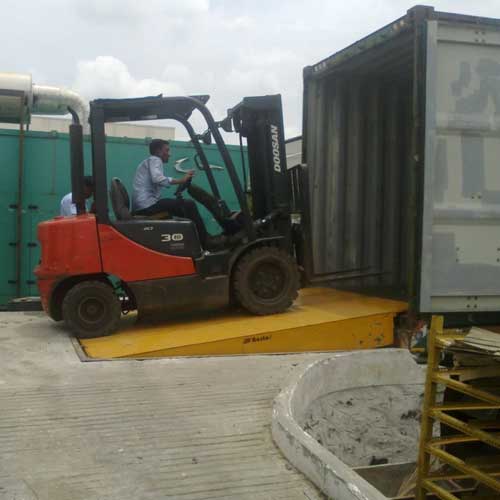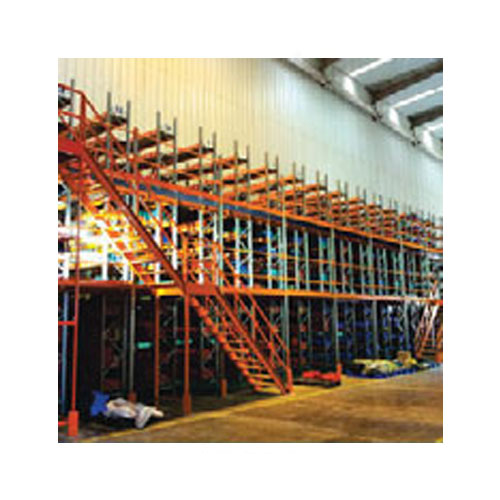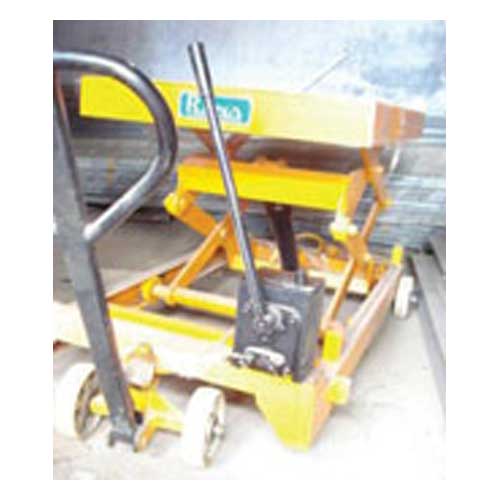Schedule a Call Back
Addverb aims to be a billion-dollar company in the next 5 years
 Interviews
Interviews- Feb 17,23

From a humble beginning in 2016-17, Addverb Technologies has today emerged as a global robotics company based out of India that automates intralogistics operations to make the businesses future-ready. In January 2022, Reliance Group came on as a strategic investor in Addverb with a commitment of $ 132 million. As part of its expansion plan, the company will very soon open one of the world's largest robot manufacturing facilities. In this interview with Rakesh Rao, Sangeet Kumar, Co-founder & CEO, Addverb Technologies, highlights changes taking place in the manufacturing sector and intralogistics operations, and Addverb is gearing up to tap emerging opportunities.
How do you see the performance of Addverb since it began the robotics journey in 2016?
Addverb Technologies was started by a group of passionate individuals who came together to provide innovative material handling automation solutions to make warehouses and supply chains (agile and robust) and meet dynamic business requirements. The company is based in Noida and headquartered in its state-of-the-art manufacturing facility, Bot-Valley.
From a revenue of Rs 1.6 crores in 2016-17 to clocking over Rs 330 crores in revenue in 2022, the company has come a long way and today has more than 750 employees spread across the world with offices in the US, Netherlands, Dubai, Singapore, Germany, and Australia.
Over the period, the company has developed an extensive product portfolio, comprising both fixed and flexible automation with a range of products which include mobile robots, sorting robots, and automated storage & retrieval systems (ASRS), powered by its enterprise software.
Addverb has established presence across multiple categories like FMCG, petrochemicals, food & beverage, e-commerce, pharmaceuticals, logistics, and more, with global conglomerates like DHL, Unilever, PepsiCo, Coca Cola, Reliance, Asian Paints, Par Pharmaceutical, etc.
Addverb also recently opened a new software development centre in Pune. As the first company in the field, Addverb was successful in installing industrial robots on a 5G stack at Jamnagar, Gujarat, the site of the world's biggest refinery complex. Moreover, the company will inaugurate another software development centre, situated in Noida, in the coming months, along with our second manufacturing facility in Greater Noida, which would be one of the world’s largest mobile robot manufacturing facilities.
The company has raised a total investment of around $ 142 million in pre-series, series A and series B round of funding where Reliance group a Fortune Global 500 corporation and a worldwide conglomerate, came on as a strategic investor in the series B round with a commitment of $132 million.
Is Addverb's second manufacturing plant operational now?
We will soon inaugurate Addverb’s second manufacturing facility spread across an area of around 15 acres, which will be fully automated, where robots will make robots.
What changes are you seeing in the intralogistics operations today? What kind of opportunities does it present to Addverb?
The industry's intralogistics operations have altered because of the increase in demand for online shopping and e-commerce, which has resulted in a greater need for faster, timely and accurate fulfilment. Not just in E-commerce, but even while fulfilling B2B orders, the need for efficient order fulfilment is ever-increasing.
In today’s competitive market, not having the right brand or the pack size can lead to customer dissatisfaction. Businesses need to ensure that their warehouses & supply chain can handle eaches (i.e. retrieval of individual units), ready to ship in less quantities – which is where automation is the only feasible solution.
With automated intralogistcs, the picking productivity increases, and storage is optimised, and for seamless order fulfilment, it has become a necessity for 3-shift warehouse operations, which is best supported by automation.
With the rise of quick commerce, the trend of Micro Fulfilment Centres (MFCs) is increasing too. These automated MFCs enable fast delivery and predict consumer demand and fulfil orders efficiently.
With Addverb’s wide portfolio of automation solutions, comprising of fixed and flexible automation, we can cater to every type of solution, which opens a lot of doors for opportunities.
What are the advantages of being a part of Reliance Industries (one of India's largest companies)?
Reliance Industries is the first true omnichannel company. With such exposure, we do get to pilot some projects and test prototypes for various industries. Reliance’s global presence also gives us a profound opportunity to scale globally.
Along with the exposure, with Reliance’s established R&D, we also get to research more and test our products in different use cases.
Reliance Industries is also one of the first companies to have implemented, along with an extensive network of 5G, which gives us the opportunity to deploy our robots on 5G stack.
How big is the industrial robotics & mobile robotics market in India? What factors are driving the demand for mobile robotics in the country?
When it comes to robotics, there are two categories – one that comprises of pick& place robots, and the other category is mobile robotics. According to Maximize Market Research (MMR), the India industrial robotics market size is expected to reach nearly $ 9.02 billion by 2027.
With offline demand of goods increasing now, and businesses planning to expand, mobile robotics cater to all the much-needed flexibility on the go.
With E-commerce and returns-handling, the reverse logistics industry is also growing exponentially. Sorting robots like autonomous guided vehicles (AGVs), a type of mobile robot, is shaping the demand of the industry.
Is the consolidation of the warehousing sector (post GST), driving the demand for mobile robotics in India?
Post consolidation of the warehousing sector, businesses tend to go for bigger warehouses, and to utilise the storage space efficiently, it is imperative that the warehouses are filled with inventory, and in such cases accurate inventory tracking is a necessity.
For efficient storage, fixed automation like ASRS is the optimal automation solution, which helps in accurate inventory. Hence, the demand for fixed automation is on the rise since the consolidation.
How are you serving India's SMEs (who are cost conscious customers)? What is the average cost of Addverb's robots?
For companies to adopt automation solutions, they should be scaling enough to be able to cater to operate big warehouses and distribution centres. Such scale is achieved only when the business crosses Rs 400-500 crores in revenue, based on our understanding of the material handing industry so far. Automation should be adopted only when there’s enough volume of orders flowing in on an everyday basis.
If the frequency or the volumes is low, fulfilment becomes more complex as and when SKUs increase. In such cases, there’s not much scope for adoption of automation. For such cases, the complexities are solved through our enterprise software, which are fulfilled by our channel partners.
India aims to become a manufacturing superpower of the world. How important will it be to adopt modern technologies (like robots) for increasing India's competitiveness? India’s focus is for Atmanirbhar Bharat – Make in India to serve globally. With the country becoming a China Plus One option for global players, India is bound to evolve. With such measures coming to place, the efficiency of the manufacturing industry will increase and meet global standards, deliver quality products, with safety measures.
With adoption of modern technologies like robotics and industrial automation, there would be no constraints in terms of skilled manpower, and the dependency will be reduced to manufacture efficiently and accurately.
What are some of the emerging trends witnessed in the robotics & automation arena in India?
Some of the changes witnessed in the industry are:
Artificial intelligence (AI): We use AI in a variety of daily activities, including online shopping, locating navigational landmarks, ordering goods, and other tasks. AI is not just important for these things; it is also crucial for robotics. The use of robotics in manufacturing has altered because of AI. They have been quite effective at relieving the workers of risky, monotonous, and tedious activities. Artificial intelligence is continually developing and maturing throughout time, greatly influencing human society. In the near future, we'll be concentrating more on implementing no-code AI solutions that will simplify accessibility.
Cobots: Cobots are collaborative robots that can safely work alongside people but still need human assistance. Cobots are a perfect answer for such a setting as the business shifts, its emphasis is to become more human-centric. They replace boring and routine duties, unlike industrial robots, and are small and portable. Cobots have many advantages over industrial robots, including being far less expansive.
5G: 5G provides faster connectivity, ultra-low latency and greater bandwidth to an extent which has never been experienced before. 5G is going to transform industries and dramatically enhancing day-to-day experiences. It has the potential to significantly improve other modern-day technologies like Artificial Intelligence (AI), Machine Learning (ML), Augmented Reality (AR) and Virtual Reality (VR).
Edge Computing: Edge computing is the emerging technology which is covering up the shortfalls or limitations in cloud computing. Currently, huge amounts of data is collected via social media, websites, emails and web searches and stored on the cloud. Edge computing helps in the easy processing of data with limited or no connectivity.
What is your “Vision 2025” for the Indian Manufacturing Sector?
With respect to government policies, we do expect some policies to be implemented like Robotic Policy and AI Policy. Along with this, PLI schemes for robotics should be implemented to promote manufacturing of robotics.
Government should also focus on component manufacturing and make an ecosystem for easy credit facility to facilitate PSU orders. Along with this, the government should also focus on some schemes to make India’s manufacturing sector more sustainable.
What are your long & short term growth plans for your company in India?
Addverb wants to become a billion-dollar company in the next 5 years and establish itself as the global leader in the robotics and manufacturing field. In the long term, we plan on getting into airport and healthcare sectors to automate their logistics. We also intend to expand our international sales through partners.
We are also planning to focus a lot on research and come up with innovative products and robots to revolutionise the automation paradigm.
In the short term, as mentioned earlier, Addverb will be opening its world’s largest mobile robot manufacturing facility which can house up to 3000 employees. With the new manufacturing facility coming up, Addverb will be able to cater to the demand of a variety of robots at one time from one single unit. Furthermore, we would like to expand our R&D centre in the US, and make it a one-of-a-kind R&D facility.
Related Stories

India Set to Launch Rs 1 Trillion Fund to Strengthen R&D, Innovation Ecosystem
This initiative aims to foster a private sector-driven research and development environment in the country, further enhancing India’s position as a global leader in innovation and technological ad..
Read more
India’s Decarbonisation Journey: Turning Climate Challenge into Opportunity
While decarbonisation is increasingly becoming a prerequisite to access premium global markets, India's path to net-zero by 2070 is complex. However, with coordinated action, strategic investments, ..
Read more
India’s Top 100 Engineering Companies 2025 by Smart Manufacturing & Enterprises
FY25 unfolded against a challenging external setting. Despite the global headwinds, India posted real GDP growth of 6.5 per cent in FY2024–25. In this edition, Smart Manufacturing & Enterprises (S..
Read moreRelated Products

Dock Leveller
Besto Material Handling Equipments offers a wide range of dock leveller.

Multi Tire
SCI Storage Solution offers a wide range of multi tire.

Industrial Lifting Equipment
Rana Material Handling Equipments Pvt Ltd offers a wide
range of industrial lifting equipment.
















